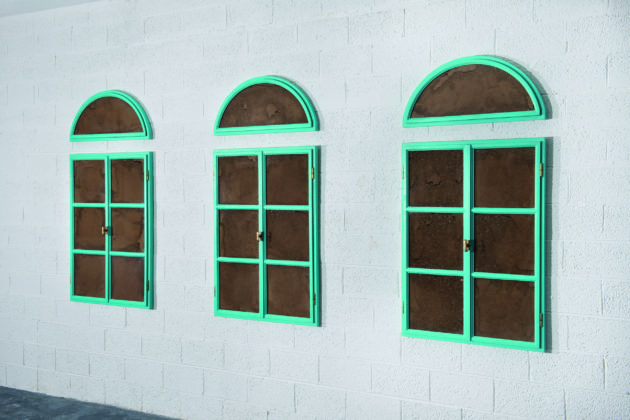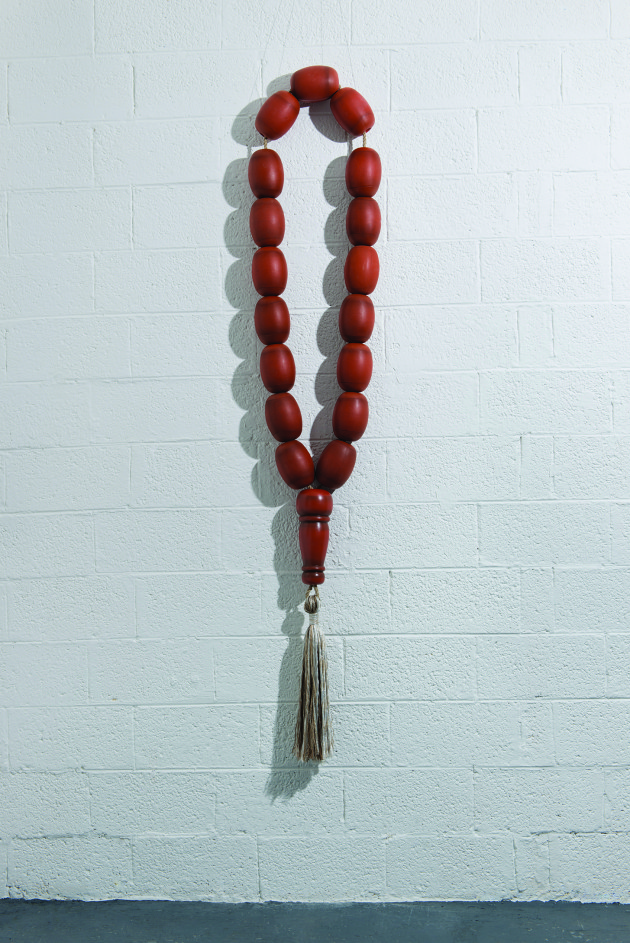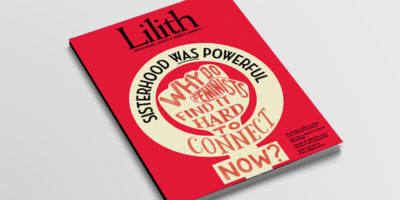Facts on the Ground

“I Do Not See the Sky,” Esther Naor, 2013.
Einat gazes at her younger sister fiddling with the CD player, trying to find the right song to match the mood of the day. As if the right background music while your house is getting destroyed will make all the difference!
She stares out the window, past the greenhouses bare and stripped so that you can’t even tell bug-free lettuce ever grew there, but no, she won’t think about that. Her eyes fall on the boy soldiers and girl soldiers dressed in black, like they’re bit players in some horror movie. If she squints her eyes, they look like black teeth. Or maybe, if she tilts her head, like a weird moving black wall. Hard to believe many of these soldiers are eighteen, like herself.
Her father over in the study is bent over a Talmud. She’s used to seeing him with a spade or pruning shears or dealing with shipments of plastic bags. He rarely studies Torah and isn’t much of a scholar, although he’s the best chazzan in all of Nevei Deklaim. And Ima, the brains of the family, is saying psalms, not writing one of her usual sharp letters to the editor of Ha’aretz that never get printed. So today everything is upside down.
“I hate them,” she hears her sister Meirav say, her face pressed against the window. “Trying to scare us like that with their black uniforms. Pathetic.”
Einat lets out a short laugh. As if their uniforms are the worst of their crimes. Anyway, she won’t waste her fury on the soldiers. And she doesn’t think the uniforms are pathetic but a brilliant move. The familiar khaki-colored army uniforms are gone. The Soldier, the chayal — the one who normally is someone’s own son, brother or sister — has now been replaced, turned into the Other.
She feels like an Other herself. Her bags are packed, unlike everyone else in her family. That one act separates her from them. There is no way she’s going to leave her clothes, photo albums, books and jewelry behind to be destroyed by the claw machine! Is her family nuts? No, the whole community is! Even if she understands why.
The Prime Minister had given them a choice. Those who leave Nevei Dekalim beforehand will be compensated with jobs to make up for their destroyed livelihoods. With a place to live, and extra cash. Sure. Only idiots believe that. And those who wait for the last day will have everything they own destroyed by the bulldozers and the claw. But at least, the people tell themselves, they will have their self-respect and the company of their friends and neighbors. For months, that’s all the neighbors talk about as they eye which family is packing, going, and which family is staying.
What a way to live, Einat thinks. She wants to shake them. What’s wrong with everybody? Children rely on parents to show them the way, and all these years she let herself be guided by her parents. Wise, good, hard-working people, everyone says, and it’s true. Her father came up with the smartest idea about how to market the bug-free lettuce overseas. And when Einat was suffering from a strange rash that no doctor could cure, it was Ima who spent hours Googling every night till she found the right treatment. But for the first time in Einat’s eighteen years, she sees she can’t rely on them. It’s like her parents jumped off a high diving board and only halfway down checked if there was water in the pool. Do they have to be so honorable and stay till the bitter end?
So her bags are packed. At least she should salvage something from this whole mess. She has even secretly packed a luggage with Ima’s bread machine and wedding albums, the nebulizer for her brother’s asthma (they use it maybe once a year, but still…) and some of the better pieces of jewelry. If Ima knew, she might get angry, but later, Einat knows she’ll thank her. Not now, but later, after the claw comes and everything is demolished. Her mother’s precious computer, too.
“You will see, you will see, how much good there will be, next year…” Her sister listens to a few bars and then switches to another song.
Ach. Meirav and her fantasies. She has always been that way, writing her little poems about the flowers of Israel and soldiers who find God in a rainbow. Actually, some of the poems aren’t bad. But today, Einat has no patience for dreamers or poets.
Through the open window, she can see the star-shaped synagogue–so cool, so retro. Her friends gather there in their garish orange T-shirts with slogans like “Disengagement is Suicide,” and “Never Again to Deportation.” They are praying like it’s Yom Kippur or something. Calling out in that open-souled way. Part of her longs to join them. But no — she shakes her head — it feels too phony. She isn’t an idealist like them. Her faith is tainted by practicality.

“My Worry Beads 2,” Esther Naor, 2014.
The black wall of soldiers has moved closer. Is that smoke she sees in the distance? She hears muffled sounds coming from the study. It’s her father moaning — or worse, crying? She can’t stand to be close to her parents right now, to hear Ima’s rants, see her finger jabbing into the air like a bullet as she makes her points — as if anyone cares — and Abba all uncomposed, his beard disheveled, the tabs of his collar twisted this way and that. Like a kid, she thinks in disgust. A kid!
The anger she has been sitting on for all these months rises up in her throat like indigested lumps of food. Her foolish, misguided, naïve family with their foolish ideologies, more precious to them than…than, she doesn’t know what. She grew up on this ideology — it was their religious duty to create little villages, settlements, in the midst of Arab enclaves, and in this way ensure a Jewish presence that could not easily be dislodged — no matter what peace deal the Israeli government might broker.
“Facts on the ground!” Rabbi Even-Cheyn declared from the pulpit, Shabbat after Shabbat. “A Jewish town is a physical fact, a reality that cannot be changed! Only in this way, building communities in the midst of the Arabs, can we reclaim our ancient land!” Not only that, the rabbi explained, but this land in the middle of Gaza is a strategic asset to Israel, and holding onto it is a way to protect Sderot, Ashkelon and many parts of Israel from Arab rocket fire. “You are the front line soldiers in this battle!” he thundered, backed up by plentiful Torah sources, a flowing beard and burning brown eyes that made him look like a prophet of Israel. And when she listened, she felt pride and imbued with purpose, like Atlas, holding up the world.
The other day Einat went to the hothouses where Abba and Ima had built up their bug-free lettuce business. The place was totally dismantled. Empty. Thirty years’ work gone down the tubes. Hundreds of livelihoods swallowed up, just like that. She kept circling the place, searching for something, a memento maybe. Finally, who should she bump into but Rabbi Even-Cheyn. He walked over, to try to give inspiration; she could tell because he had that shiny, idealistic look in his eyes. She tried to turn away but he called out, “Einat, chazak v’amatz! Be strong — for all the Jewish nation.”
She stared at him. What are you talking about? She wanted to yell: You let us down. You fed us slogans. Facts on the ground, facts on the ground. That’s all I ever heard from you. You said a Jewish government would never kick out Jews from their own homes. Never. You promised! All she muttered now was, “Chazak v’amatz,” and got out of there fast.
Well, today, the Never is happening.
Einat peers out the window at a boy who is two years older than she is, crawling on the road, clawing at the dust, moaning like a woman in labor. She knows that boy. Doron. In fact, one summer she had a crush on him. But look at him now, like an animal. How’s that for a fact on the ground? She snorts softly.
Meirav takes out her tiny book of psalms and begins to pray, her lips moving tautly, quickly. Einat can hear Ima in the study shouting into the phone, “My computer’s not working. You don’t understand, I have to send this email to the Prime Minister!” The intensity in her mother’s voice makes Einat cringe. How will Ima leave the house when the soldiers come for her — with dignity, or screaming, refusing to budge, each one holding a limb? When she closes her eyes and sees that image her palms prickle with dread. Einat’s Torah teacher, Gveret Shemer, says a religious woman should never draw attention to herself. Gveret Shemer who travels in from Bnei Brak to teach is the picture of self-containment and refinement in her short, black, side-parted sheitel.
Abba suddenly barges from the room, his big knitted yarmulke sloping to one side. “I’ll be back,” he calls to the girls. Einat sees him stride toward the soldiers, his speckled beard fluttering. What’s he going to say to those soldiers that will change their minds? Her parents are dreamers. Dreamers! And now Ima has leapt up and is joining Abba outside.
Einat turns away — she can’t bear to watch them make jokes of themselves — and goes to the kitchen. She pours herself some orange juice, their last carton. She sees the sandwich maker next to the toaster. Meirav begged Ima to buy it, but they rarely use it. No loss there. Her eyes drift toward the silhouette she drew of her father years ago, a pretty good likeness, considering she has no artistic ability. It always touched her that her parents hung it up for all these years. If it had been her child, it wouldn’t have lasted more than a week. Clutter. But now the thought that her silly artwork will be destroyed by the claw makes her stomach bend in two.
She stares at the clock that makes funny bird sounds on the hour, at the terra cotta-colored backsplash that Abba set behind the sink with his own hands, doing the caulking and all. She can already picture the claw coming, can hear the horrible growling sound of stone giving way, the slow caving in of walls, dishes flying, the oven turning to metal pulp, the leather easy chair collapsing like mud, bricks flinging everywhere. The whole world is collapsing. She feels a tightness in her chest. It’s hard to breathe, as if the claw has already done its work, filled her home with ash and smoke. Can a house disappear just like that? She lets out a groan. “All gone,” she mumbles.
Meirav lifts her head from her psalms. “Stop it!” she implores, her wispy hair falling into her eyes. “Rabbi Even-Cheyn says a person should have faith even as he feels the sword on his neck.”
Einat says nothing, just shakes her head. Who can she even talk to? Nobody’s left. How come she’s the only smart one? If she’d been the head of this whole Gush Katif movement, she would’ve focused on different things, instead of land, land, land. She would’ve tried to get the public on their side. Change people’s minds and hearts. A movie could’ve done that with some famous actor. But whenever she suggested that, people just laughed at her.
Well, they won’t laugh much when she decides to leave, Einat thinks. And then she straightens and rubs her eyes. Leave? But where will she go to? She and her friends are all signed up for National Service. She’d been hoping to get assigned to a school in some poor development town up North. But suddenly the idea of being together with all her friends who think just like her — or the way she used to, Eretz Yisrael Shleima — the Greater Israel and all that — makes her gag. Forget it. No way will she join them. Her bags are packed. She doesn’t know where those bags will take her, though.
Meirav is now fiddling with the radio and lands on a Kotel classic. “…There are men with hearts of stone,” it plays, “…there are stones with hearts of men.”
“You know what?” Einat flings out, “I’m going to Bnos Devorah seminary in the fall.”
Meirav squints at her. “What are you talking about? Where’s that?”
“It’s in Bnai Brak,” she clarifies. Where Gveret Shemer, her Torah teacher, lives.
Meirav’s eyes go round with shock. “You’re kidding, right? A black hat place? For hareidim?”
Yeah, she was kidding, but now suddenly it doesn’t seem so crazy. She has seen the children who live over in Bnai Brak, boys with their swinging side curls, children who aren’t complicated by the outside world, by politics, by foreign music. She has seen the girls her age who dress with a modesty of a different era, girls who strike her as complete. Einat shakes her head. “Our whole life, it’s over.” Her hand cuts sideways through the air, chopping all their slogans and ideology in half, and another chop — into quarters. “Obsolete,” she says harshly.
“Hah, hah, sure,” Meirav scoffs. “You’d last a week with the dossim. No, a day.”
Einat shrugs. Her sister still thinks the world begins and ends with Gush Katif.
“Or who knows,” Einat continues, playing with the curtain, something Ima always forbade because it gets smudged so easily, but now, who cares? “Maybe I’ll go to journalism school.” But of course there won’t be money for such things. Or for anything. Overnight they’ll be beggars.
Meirav merely flicks off the radio, no longer paying attention. “Ach, this song is too sad!” She saunters off into her bedroom.
Is that a sound of a luggage getting dragged out of her sister’s closet, Einat wonders, just as she hears a woman’s high-pitched scream from outside. The scream rises above all the noise and tumult. It is pitched so high, so powerfully loud, the entire village must hear its raw anguish. Einat swallows. A split second later she recognizes the voice.
Ima. Einat’s hands and throat go cold. It’s Ima, for sure. The shock of her mother’s cry propels her toward the front door. Ima! I’m coming — the thought shoots through her brain as she flings open the screen door and runs outside. She cranes her neck, looks past the old petting zoo evacuated three weeks ago, looks here, there, beyond the claw machine waiting to begin its horrible work. She blinks and sees teenage boys crouching on a roof with buckets of red paint — as if they could stand up against an entire army! — she sees smoke rising from one of the houses, she sees crowds of people streaming past, the ones in orange, and always, always, the soldiers in black, but where is Ima, where oh where is her Ima? Her breathing comes in fits and starts. She runs toward the claw, and right there beyond the empty greenhouses she spots — yes! — her mother’s straw hat and her blue peasant skirt. A crowd of girl soldiers surround her. One holds out a bottle of water toward her mother. Ima’s hat is askew, her face blotchy and distorted with fury, her head is bobbing up and down, her arms are moving like a windmill, and she looks like….like a clown!
Ima is screaming at the top of her lungs: “You stole our cucumbers, our parsley, our dill! You cut off our feet.” She shakes both arms wildly.
Einat covers her mouth. Is that Ima, truly? Her mouth goes dry as smoke. A shudder starts in her shoulders and travels down her arms and palms. So silly, so sad. Ridiculous, roars through her. She ducks behind a mailbox, crouches there, hidden — and then — hurry, fast, before anyone sees — she turns back, runs the other way, fast, faster, her shoes scuffing against each other in her speed to get away from that horrible spectacle. Silly and sad, silly and sad. The words repeat like the banging of a shovel against her head. Her chest is hurting so much, each breath pokes her like glass. She keeps running, but her lungs are closing and it’s so so hard to breathe, until finally the earth rises and she trips and falls to the ground near a palm tree, and there she rubs her knees and whimpers, Ima.
Ruchama King Feuerman is the author of the novels In the Courtyard of the Kabbalist and Seven Blessings.



